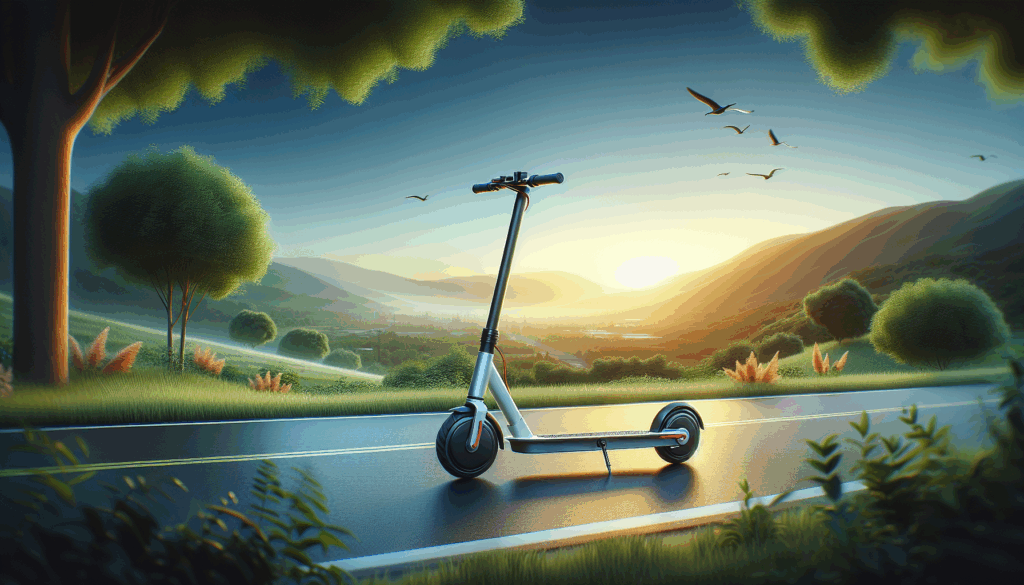
In the ever-evolving landscape of personal transportation, electric scooters have emerged as a popular choice for eco-conscious commuters and adventure seekers alike. At the heart of these innovative vehicles is the lithium ion battery, a powerhouse that not only provides the necessary energy to keep you moving but also contributes to a pollution-free environment. Understanding what lithium ion batteries are, why they are indispensable in electric scooters, and how proper battery health management can enhance your riding experience is crucial for any e-scooter enthusiast. With the right care, including annual load testing, you can ensure that your battery remains in optimal condition and supports your journey smoothly and efficiently.
What Are Lithium Ion Batteries?
Lithium ion batteries are rechargeable power sources that have become increasingly popular in a variety of applications, notably in electric scooters. These batteries function based on the movement of lithium ions from the anode to the cathode during discharge and vice versa during charging. With a high energy density and the ability to hold a charge significantly longer than other battery types, lithium ion batteries offer efficient electrochemical performance that enhances the overall riding experience of electric scooters. They are lightweight and compact, making them an ideal choice for the design demands of modern electric scooters while providing riders with a longer range on each charge.
The efficiency and effectiveness of lithium ion batteries are a few of the reasons they are the preferred choice for electric scooters. As riders seek seamless travel experiences with minimal downtime for charging, these batteries deliver the necessary power and longevity. Battery health is paramount for optimizing performance; hence, riders must ensure proper care and maintenance of their batteries, including load testing annually. This not only prolongs battery life but also ensures the scooter operates at peak performance, allowing riders to fully enjoy their journeys without unexpected interruptions due to battery failure.
Why Are Lithium Ion Batteries Used in Electric Scooters?
Lithium ion batteries have emerged as the preferred power source for electric scooters due to their superior energy density and light weight compared to traditional battery types.
They are capable of storing more energy in a smaller space, making them ideal for the compact design of electric scooters. Moreover, lithium ion batteries have a longer cycle life, which means they can be recharged numerous times without degrading quickly, providing consumers with more value over time. Their efficiency in converting and holding charge enhances the performance and range of electric scooters, allowing riders to cover greater distances on a single charge. This blend of performance and portability ensures that electric scooters remain a popular choice for urban commuting and short trips.
Furthermore, the environmental benefits of lithium ion batteries cannot be overlooked. They are less harmful than lead-acid batteries, which often release toxic materials, ensuring a more sustainable option for eco-conscious consumers. Using lithium ion technology contributes to reducing carbon emissions, aligning with the growing demand for greener transportation solutions. Monitoring battery health is crucial to maintain optimal performance, and riders are encouraged to have their batteries load tested annually. By taking care of lithium ion batteries—such as avoiding extreme temperatures and not completely discharging them—users can extend their lifespan, ensuring they continue to deliver reliable power on every ride.
Understanding Battery Health and Its Importance
Battery health is a crucial factor in the overall performance and longevity of electric scooters. Lithium-ion batteries, widely used in these scooters, have several advantages, including lightweight construction, high energy density, and minimal self-discharge rates. However, maintaining their health is essential, as degraded battery performance can lead to reduced range, loss of power, and ultimately, the need for a costly replacement. A healthy battery will not only ensure a smooth and reliable ride but also enhance the riding experience and safety for the user. Regularly monitoring battery health can help identify potential issues before they escalate, allowing for timely care and maintenance.
To maintain your lithium-ion battery’s health, it is vital to practice good battery care habits. Users should avoid overcharging or fully discharging the battery, as extreme states can contribute to deterioration. Instead, practicing partial discharges and keeping the battery in a moderate temperature environment can prolong its lifespan. Additionally, getting your battery load tested annually is a proactive step that helps ensure your battery is performing optimally. This simple maintenance task aids in identifying any underlying issues, enabling you to address them promptly and prolong the lifespan of your electric scooter‘s battery.

Tips for Taking Care of Your Lithium Ion Battery
Taking care of your lithium ion battery is crucial for maintaining the performance and longevity of your electric scooter. Regularly monitoring the battery’s charge level can help prevent overcharging and deep discharging, both of which can significantly affect battery health. It is advisable to keep the battery between 20% and 80% of its capacity whenever possible. Additionally, always use the charger recommended by the manufacturer, as using an incompatible charger can lead to battery damage. Storing your electric scooter in a cool, dry place can also protect the battery from extreme temperatures, which can adversely affect its lifespan.
Another essential tip for battery care is to avoid leaving your battery discharged for prolonged periods. Doing so can lead to irreversible damage. It’s also encouraged to have your battery load tested annually to ascertain its health and efficiency. This test can identify any underlying issues that might not be immediately apparent but could impact your scooter’s performance over time. By following these tips, you can ensure that your lithium ion battery remains in peak condition, ultimately enhancing your riding experience and extending the life of your electric scooter.
The Importance of Annual Battery Load Testing
Annual battery load testing is crucial for maintaining the performance and longevity of lithium ion batteries in electric scooters. This process helps to assess the battery’s ability to hold a charge and deliver consistent power during operation. By conducting regular checks, riders can identify any potential issues, such as diminished capacity or irregular discharge patterns, that may indicate a failing battery. Ignoring these signs can lead not only to reduced performance but also to potential safety hazards, jeopardizing the rider’s experience. Regular load testing ensures that the battery operates efficiently, prolonging the life of your electric scooter and enhancing your overall ride experience.
Furthermore, typical battery maintenance, such as load testing, accounts for environmental factors and usage patterns that might impact battery health. As electric scooters rely heavily on these batteries for power, understanding their condition is paramount. With load testing, riders can proactively address issues before they escalate, potentially saving on costly replacements. Regular checks also foster an awareness of when the battery might require charging, improving the efficiency of your rides and keeping your electric scooter in peak condition for daily commutes or leisurely outings.
Common Myths About Electric Scooter Batteries
There are several misconceptions surrounding electric scooter batteries, particularly lithium-ion batteries, which can lead to confusion among potential users. One of the most common myths is that all batteries are created equal. While lead-acid batteries were once prevalent, lithium-ion batteries have emerged as the superior choice due to their lightweight design, higher energy density, and longer lifespan. This performance allows electric scooters to travel greater distances on a single charge compared to older battery technologies. Furthermore, some people believe that keeping the battery plugged in at all times is beneficial. In fact, overcharging can damage lithium-ion batteries, leading to a decline in performance and safety issues.
It’s essential to understand proper charging practices to ensure optimal battery health and longevity. Another myth that often circulates is that lithium-ion batteries are too delicate and require constant attention to maintain their health. While it is true that these batteries benefit from optimal care practices, they are designed to withstand regular use and only require routine maintenance. An important aspect of battery care is to load test the battery annually, which can help identify any underlying issues before they become serious problems. By adopting a proactive approach to battery maintenance and dispelling common myths, electric scooter riders can enjoy a more reliable and efficient ride for years to come.
The Future of Battery Technology in Electric Scooters
The future of battery technology in electric scooters is set to be a game-changer for the entire industry. Lithium-ion batteries, known for their high energy density and long cycle life, are becoming the predominant power source for these eco-friendly vehicles. As technology advances, we can anticipate improvements in battery capacity, faster charging times, and enhanced durability, all of which contribute to a more reliable and efficient riding experience. Innovations such as solid-state batteries and improved thermal management systems are paving the way for a revolutionary shift in how electric scooters operate, making them not only more sustainable but also more accessible for everyday users.
As the demand for electric scooters continues to rise, manufacturers are actively investing in research and development to push the boundaries of battery technology. This focus on lithium-ion advancements will lead to lighter weight batteries with greater longevity, enabling users to travel longer distances on a single charge. Moreover, initiatives to improve battery recycling processes will further enhance sustainability, reducing environmental impact while maintaining peak performance. The future of electric scooters hinges on these advancements, ensuring a cleaner and more efficient mode of transportation for urban commuters worldwide.

Empowering Your Journey with Lithium Ion Batteries
In conclusion, lithium ion batteries serve as the backbone of electric scooters, providing a reliable and efficient source of power that enhances the riding experience. Their lightweight design and robust energy density make them ideal for electric mobility, ensuring longer rides and quicker charging times. As we increasingly embrace electric scooters as sustainable transportation options, understanding the significance of these batteries becomes essential. Maintaining battery health through proper care, such as avoiding deep discharges and optimal charging practices, will not only prolong battery life but also enhance your scooter’s performance.
Furthermore, an annual battery load test is a proactive measure that can help detect potential issues before they become significant problems. Regular testing ensures that your battery remains in optimal condition and can handle your commuting needs without fail. By staying informed and taking care of your lithium ion battery, you can fully enjoy the convenience and efficiency of your electric scooter while contributing to a greener environment. So keep riding, charge wisely, and empower your journey with well-maintained lithium ion batteries.
